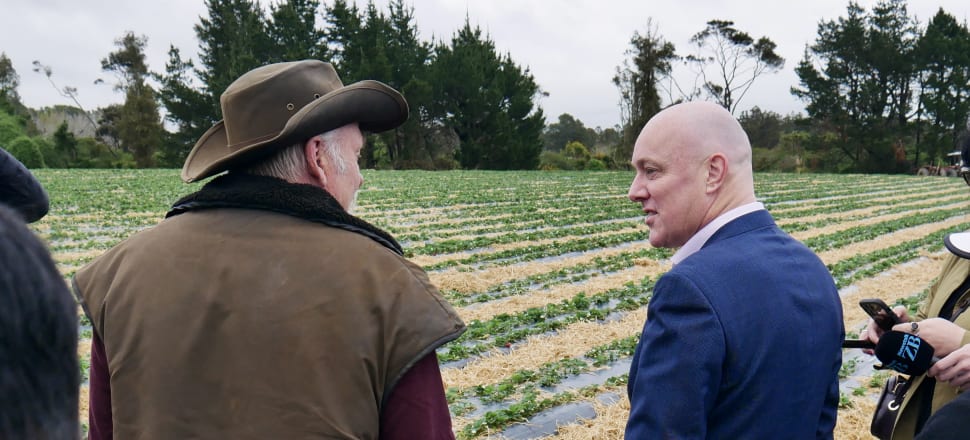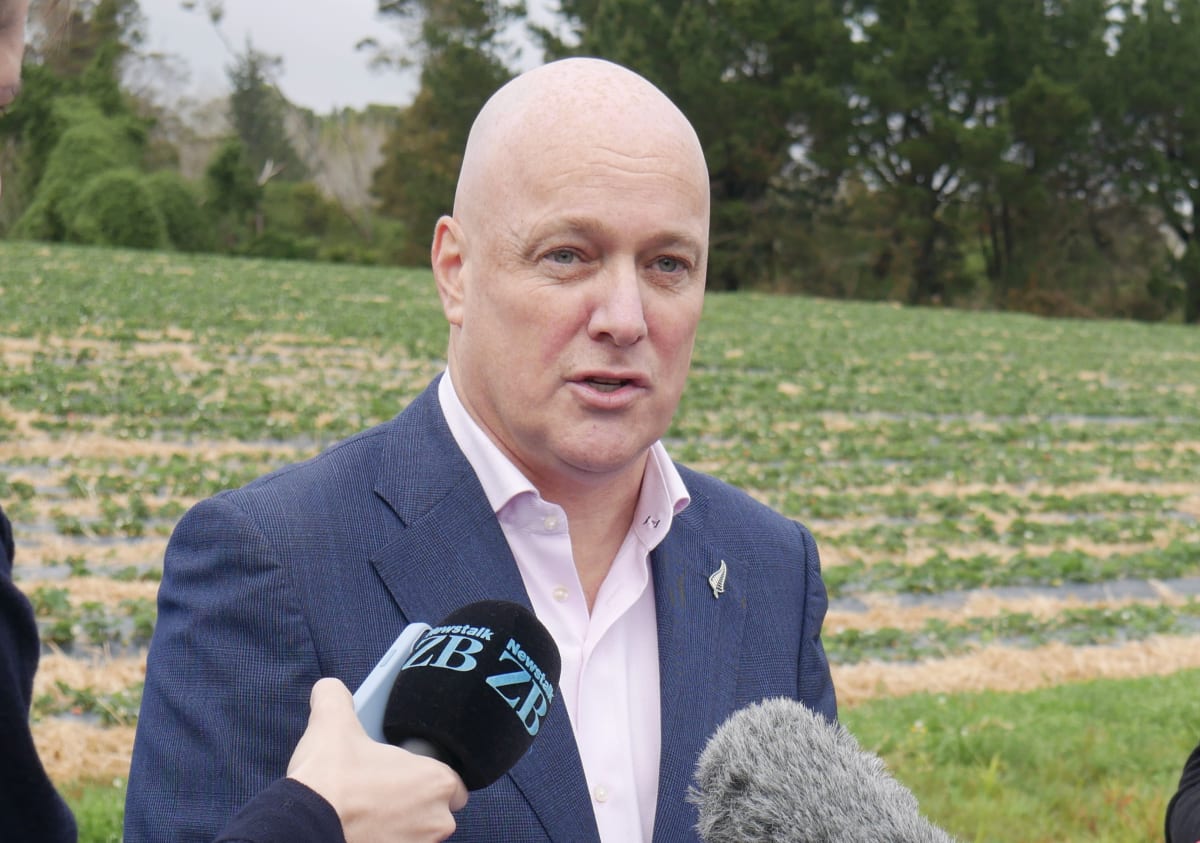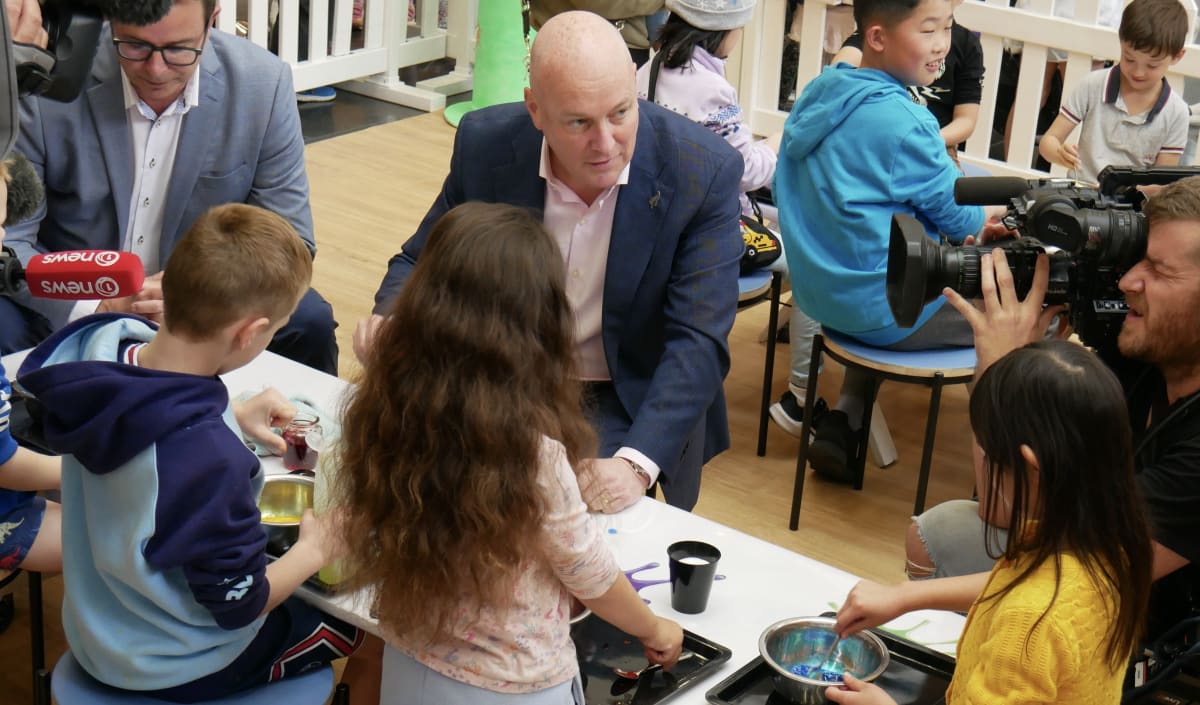
National says its new sanction system for people on Jobseeker support will break a cycle of dependence – but its political opponents are calling it heartless
National Party leader Christopher Luxon appeared in a West Auckland strawberry field this morning to announce stricter obligations for people on Jobseeker support.
Phil Greig’s strawberry fields haven’t quite been there forever, but it has been 33 years since he started selling strawberries from the side of State Highway 16 in Kumeu.
READ MORE:
* Luxon's call on New Zealand First could come back to bite him
* Luxon and media playing intense game of hide and seek
But recently, Greig said he’s struggled to find people to come and pick them.
Closed borders and worker shortages have created tough conditions for the strawberry farmer, even with his pick-your-own service in the summers.
Luxon made the trip across town to promise Greig his policy would provide local workers to get out in the fields.
How he plans to go about this is by imposing stricter regulations on people on Jobseeker support with the aim of pushing more into the workforce.
A traffic light system for Jobseeker beneficiaries will label people compliant, some risk or high risk, with the latter accompanied by the red light sanctions like benefit reductions, benefit suspension, money management and mandatory community work experience.
National would also require jobseekers to reapply for their benefit every six months (as opposed to a year at present) and provide proof of job applications and interview attendance.
A one-month benefit stand-down would also apply for people evading arrest warrants.
Luxon said roughly 85 percent of people receiving Jobseeker support are compliant under the policy.
That leaves around 25,000 Kiwis who would soon be facing benefit sanctions or non-financial sanctions like mandatory money management, community work, or training.

“In a country like New Zealand you have rights to be able to get the support you desperately need when you need it, and that’s what the safety net is there for, and the welfare system is there for,” Luxon said. “But you also have a responsibility to your fellow citizens who are the taxpayers who are funding that welfare system to make sure you are doing everything you can and you are holding your end of the deal up by making sure that you’re meeting your obligations.”
The policy introduces two new non-financial sanctions: money management and mandatory community work.
Money management would see the beneficiary’s rent, bills and debts paid directly by WINZ, with half the remaining money going to a payment card that can be used to buy groceries at approved stores, and what’s left going to their personal bank account.
A $340-a-week single Jobseeker benefit without any accommodation supplements might see more than $200 go to rent and bills, and around $100 left to split up between all other expenses.
Mandatory community work is another new lever National would introduce – this would see jobseekers doing work experience at local community organisations, iwi, council or government organisations.
It’s a mechanism that will ultimately provide people like Phil Greig with more workers, according to Luxon – but his political opponents aren’t mincing their words in sanctioning his sanctions.
Prime Minister Chris Hipkins said the Welfare Expert Working Group’s report in 2019 found sanctions are not an effective way to get people into work.
The government-commissioned report found a longer-term approach to social security is needed, as well as a more careful look at how children and young people are impacted.
According to the report, “there is little evidence in support of using obligations and sanctions (as in the current system) to change behaviour; rather, there is research indicating that they compound social harm and disconnectedness. Recent studies recommend moving away from such an approach towards more personalised services.”
National pointed out the 50 percent limit on sanctions for families with young people would be maintained. However this does not appear to cover the mandatory one-month benefit stand-down period for those evading a warrant for arrest.
Greens social development spokesperson Ricardo Menéndez March said the policy would create misery and hardship for those who needed help the most.
“National is deliberately and heartlessly choosing to make life harder for thousands of people. A National government would literally leave children to go hungry and punish families,” he said. “It is cruel, ill-thought out, and will endanger the wellbeing of thousands of people.”
He said the sanctions created “punitive hoops” for people who were already struggling to jump through.
The Greens have also been critical of the Labour Government’s level of benefit sanctions, especially following the revelation last year the Ministry of Social Development had sanctioned 114 people with a health condition or a disability for “failing to prepare for work”.
This resulted in Minister of Social Development Carmel Sepuloni committing to end sanctions on beneficiaries with disabilities, but the Greens are calling for all sanctions to stop in line with the 2019 report.
“Sanctions do not support people into meaningful employment or participation in our communities,” Menéndez March said. “Taking away people’s incomes only exacerbates poverty and pushes them into debt.”
But back at the berry patch, Luxon and National Party social development spokesperson Louise Upston resisted the idea the sanctions eroded the dignity of the people doing it the most tough.
Upston mentioned a story she’d heard of somebody on Jobseeker support showing up to a job interview in their pyjamas, but was unwilling or unable to provide much more detail.
It came down to Luxon’s assertion that if you have the right to a Jobseeker’s benefit, you accordingly have the responsibility to get off it as well.
“Hey listen, this is the deal in New Zealand, we have rights, which is you get support when you desperately need it, and we are here to help you transition into work,” he said. “All we’re asking you to do is be clear on the obligations and therefore the consequences.”
It’s harsh news for the thousands on Jobseeker dealing with an array of life-complicating factors or barriers to joining the workforce not catered to by the welfare state.
On the other hand, it’ll be received happily by much of National’s core voter base – especially if it actually ends up creating a pipeline of workers for people like Phil Greig.
After he’d finished up at the strawberry farm, Luxon headed to Westgate shopping centre to shake some hands and take some selfies.
With significant media scrum and personal entourage in tow, Luxon moved slowly down the linoleum stopping to chat to almost every group he passed.
He then took a seat at a low table at a school holiday programme in the middle of the mall and helped some children make slime.
At first his was a brilliant blue, but then somebody added in a few drops of yellow, and the whole concoction went green.
“Anything but green,” a National Party volunteer said as he looked on.

Luxon commits fully to the walkabout and comes readily-armed with small talk and dad jokes to ingratiate himself with the public, before segueing into a bit of policy-selling if the chance presents itself.
At one point he approached a man sitting in a cafe and took the beanie off his head. The man had a similarly hairless pate, and Luxon asked him the details of his haircare routine.
He then went on to stoop down and quiz a bunch of children about their schooling.
“Are you getting an hour of reading and writing every day?” he asked one young boy.
It seems it’s hard to pull Luxon away from the public once he gets started. One staffer was checking his watch and then telling the party leader they needed to head in another direction. But before that could sink in, Luxon was back fraternising with another group of school kids.
“Do you know who that was?” one mother asked her child as they walked away. “That’s the man who will maybe be Prime Minister.”







